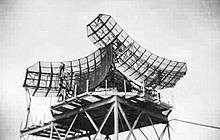General Electric AN/CPS-6 Radar
The AN/CPS-6 was a medium-range search/height finder Radar used by the United States Air Force Air Defense Command.
 General Electric AN/CPS-6 Radar | |
| Country of origin | United States |
|---|---|
| Type | Medium-range search/height finder |
| Other Names | AN/CPS-6, 6A, 6B, AN/FPS-10 |
The AN/CPS-6 was developed during the later stages of World War II by the Radiation Laboratory at MIT. The first units were produced in mid-1945.
General Electric developed and produced the A-model and subsequent B-model at a plant in Syracuse, New York. The unit consisted of two antennas. One of the antennas slanted at a forty-five degree angle to provide the height-finder capability.
Initially, the radar was designed to detect fighter aircraft at 100 miles and 16,000 feet. The radar used five transmitters that operated at S-band frequencies ranging from 2700 to 3019 MHz. It took twenty-five people to operate the radar.
An AN/CPS-6 radar was installed as part of the Lashup Radar Network at Twin Lights, New Jersey, in 1949 and proved capable of detecting targets at ranges of eighty-four miles. The first units of the follow-on 6B radar set were ready for installation by mid-1950. Fourteen 6B units were used within the first permanent network.
A component designed to improve the radar's range was added in 1954. Initial tests showed the 6B unit had a range of 165 miles with an altitude limit of 45,000 feet. One radar unit and its ancillary electronic equipment had to be transported in eighty-five freight cars. The Air Force phased out the 6B model between mid-1957 and mid-1959.
The AN/FPS-10 unit was essentially a stripped-down version of the AN/CPS-6B. Thirteen of these units served within the first permanent network.
References
![]()
- AN/CPS-6 @ radomes.org
- Winkler, David F. (1997), Searching the skies: the legacy of the United States Cold War defense radar program. Prepared for United States Air Force Headquarters Air Combat Command.
